 Mitla Pass
Mitla Pass by
Leon Uris Formats available: hardcover, paperback, large print, ebook,
Pages: 496
Published by Estate of Leon Uris on December 13th 2016 (first published July 1st 1988)
Purchasing Info: Author's Website,
Amazon,
Barnes & Noble,
Kobo,
Bookshop.org Goodreads A “riveting” New York Times bestseller by the author of Exodus about an American in Israel drawn into the danger of the Suez Crisis (Library Journal). How did Gideon Zadok, an American novelist and screenwriter, end up pinned by artillery shells in Mitla Pass? It was never his plan to fight someone else’s war. He came to Israel to research a book, but also to escape a crumbling marriage, a dysfunctional family, and the pressures of newfound success in the States. But in fleeing from personal troubles he charged headfirst into one of the great global crises of the twentieth century. Perhaps Leon Uris’s most introspective work, Mitla Pass portrays a man caught between his own demons and the epic sweep of Middle Eastern history.
 I still remember when I first picked up one of Leon Uris’ books. It was in the early 1970s, and I was at my grandparents’ apartment after Sunday School. As usual, my dad was arguing politics with my grandfather (his father) and also as usual, it looked like it was going to take forever. As usual. I discovered a beat-up copy of Exodus lying around, and started reading. I could always get lost in a good book, and I certainly got lost in this one. After devouring Exodus, I went back and read some of the author’s earlier books, like Battle Cry, and then picked up subsequent volumes as they came out, always certain of being swept away by a great story. QBVII turned out to be my favorite. I loved the ending.
I still remember when I first picked up one of Leon Uris’ books. It was in the early 1970s, and I was at my grandparents’ apartment after Sunday School. As usual, my dad was arguing politics with my grandfather (his father) and also as usual, it looked like it was going to take forever. As usual. I discovered a beat-up copy of Exodus lying around, and started reading. I could always get lost in a good book, and I certainly got lost in this one. After devouring Exodus, I went back and read some of the author’s earlier books, like Battle Cry, and then picked up subsequent volumes as they came out, always certain of being swept away by a great story. QBVII turned out to be my favorite. I loved the ending.
So when the Estate of Leon Uris contacted me about featuring one of his books, it provided me with the opportunity to become re-acquainted with an author I had fond memories of. It was also a bit of struggle to find one of his books that I had not read. In the end, we settled on Mitla Pass (the only other possibility was The Haj. I had read everything else way back when).
Today seemed like the perfect day for this review. Yesterday, April 23, was annual Holocaust Remembrance Day at Yad Vashem in Jerusalem, and Mitla Pass, like so many of the author’s books after Battle Cry, reflects both on the author’s Jewish heritage and on the scars left behind by the Holocaust, not just on the survivors but on the world that finally admitted the truth of the atrocities. In so many ways, the vast swath of death and destruction of the Jewish communities in Europe under the bootheel of the Nazis led directly to the formation of the State of Israel. And, in due historical course, to the story told in Mitla Pass.
My Review:
The story in Mitla Pass is told both in its present, late October 1956, and in its past, the past of all of the characters in the novel that led them to be part of that particular moment.
The main focus of the story is writer Gideon Zadok, who has come to Israel to write a book about the birth of the modern State out of the fires of Zionism and the ashes of the gas chambers. Gideon is an American who made his reputation as a writer on the strength of his best-selling book about his experiences as a Marine in the Pacific Campaign of World War II. (Any and all resemblances to the author of the book are probably intended).
After months of research, Gideon finds himself and Israel in the middle of a crossroads. He doesn’t think that he has quite captured the soul of the people. Of his people. And Israel is being squeezed on all sides by its Arab neighbors. The proximate causes of the 1956 Suez Crisis were Egypt’s embargo of Israeli shipping through the Suez Canal, and the English and French desire to take the Canal back from Egyptian control. The alliance between the Israelis and the English and French was very shaky, with everyone looking over their shoulders at probably interference from the Americans, the Russians, or both at any moment.
So Gideon, now somewhat trusted by the Israelis, gets himself attached to a paratroop drop into the western edge of the Sinai Peninsula. But the story really isn’t about that completely FUBAR’ed drop. It’s about everything that came before.
And it’s a marvelous story.
Escape Rating B: It is a marvelous story, and I was caught up in it until the wee hours of the morning. That’s part of what I remember about the author’s work – once you got sucked in, you stayed sucked until the end.
But the world has changed a bit since this story was written in 1988, and even more so since the period it covers, 1956 and the years that came before. And I’ve changed since the 1970s and 1980s, so there are things that bother me now that didn’t raise an eyebrow then.
Gideon’s own story is the one that carries the book, and he’s an absolutely captivating character. A charmer and a storyteller almost from the moment that he first draws breath. Also a cocky, egotistical, selfish, self-absorbed son-of-a-bitch. His thoughts about women in general, and his treatment of his wife and his mistress made me gnash my teeth on more than one occasion.
But what fascinated and disturbed me most, often in equal measure, is that Gideon is so clearly a fictionalized version of the author himself. Both were Marines in World War II, and fought the same battles and were injured in the same places and the same way. Both turned their experiences into best-selling books and later successful screenplays. Both were in Israel in 1956 researching books about the formation of Israel. At the ending of Mitla Pass, Gideon envisions his upcoming book and its first scenes extremely close to where Exodus begins and how Exodus opens.
It’s a little eerie. So eerie that I’m left wondering how much of the earlier history of the character mirrors the author’s own. And because of that I’m left pondering some of Gideon’s background. In particular, the book for the most part clips along at a very rapid and intensely readable pace, with one exception. The parts of the story that dive deep into Gideon’s family background, particularly the experiences of Gideon’s father Nathan, stop cold because Nathan is such a completely unlikable and unfortunately completely predictable character. Also incredibly annoying to read about. It makes me wonder if the author was describing his own father, possibly as a way of exorcising a few ghosts. And if that was so, based on the description, it’s hard to blame him.
Teeth-gnashing aside, I had a good time with Mitla Pass, obviously better than the characters stuck in that seemingly pointless battle. The vast historical background, from the shtetls of the 19th century Pale of Jewish settlement in Russia to the early 20th century Jewish community in Baltimore to the beginnings of Zionism to the brief flourishing of the Communist Party in America are fascinating. The cross-section of people, places and events keep the pages turning. It makes a very tasty goulash.
I’m glad I had this opportunity to revisit an author who I remember reading quite fondly, and my reading of his books in a time and place that exists now only in my memories.
5 digital copies of MITLA PASS will be distributed to giveaway winners via Trident’s Digital Downloads page. Each giveaway winner will be given a separate download code that expires within 24 hours of use. Winners may download ebook files to the device of their choice; however, please note that these copies are not protected by DRM.
a Rafflecopter giveaway
To get a taste for Mitla Pass, read the opening excerpt, below the fold.
TEL AVIV
October 20, 1956
D DAY MINUS NINE
THE PRIME MINISTER’S COTTAGE, a remnant of the former German colony, sat unobtrusively in the midst of the outsized defense complex on the northern end of Tel Aviv. Midnight had come and gone. The stream of callers faded to a trickle, then halted.
For the moment David Ben-Gurion sat alone, his first opportunity all day for solitary contemplation. He was behind a desk that looked down a long conference table which was covered with green felt. Dead cigarette butts spilled over their ashtrays. The fruit baskets held spoiling apple and pear cores, grape seeds, banana skins, and peach pits, their fruit devoured. Half-empty soda bottles had lost their fizz and others, tipped over in disarray, appeared like a platoon of soldiers caught in a cross fire.
The cleanup crew of soldiers, two young men and two young women wearing top-security clearance badges, tiptoed in and attacked the mess.
“Can I get you anything—some tea?” one of the girls asked.
Ben-Gurion shook his head. It was a great head that seemed even greater perched on his short dumpling body. It was bald on top with an angry white mane flaring out in every which direction. The cherub face remained deceptively peaceful.
“Where are you from?” he asked.
“Morocco,” one of the girls said.
“Romania. I live at Moshav Mikhmoret.”
“South Africa. My family is in Haifa,” the second girl said.
“I am a sabra, Kibbutz Ginnosar.”
“Yigal Allon’s kibbutz,” Ben-Gurion said.
“Yes,” the soldier boy answered proudly.
Ben-Gurion’s head tilted and his eyes blinked. He was a past master at grabbing forty winks, a skill honed at a hundred Zionist conferences. When the crew departed it was nearly two o’clock in the morning.
The Old Man’s eyes fluttered open and became fixed on a single paged document awaiting his signature, the approval of a plan, Operation Kadesh, that would commit his young nation to war. Only eight years earlier he had signed another document, a proud document that declared statehood. Would there even be a ninth birthday, or would it all end in horror like a biblical siege with a final ghastly scene of a national massacre?
The past three weeks had been nightmarish in the speed and intensity of events: the secret meetings in Paris with the French and later the British and the clandestine agreement to go to war together … the return of Israeli officers who had been training in military academies and army specialty schools around the world … the call-up of reserves … the near-disastrous raid on Kalkilia to make the world believe that Jordan, not Egypt, was the enemy of record … French equipment arriving without spare parts … pressure from Eisenhower and the Americans mounting daily … dire threats from the Russians …
Operation Kadesh. How esoteric, Ben-Gurion thought. The biblical site in the Sinai where the Jews dwelled for a time during their wanderings with Moses.
Operation Kadesh needed a series of miracles to succeed. Every assessment was frightfully the same: Israel must win the war in the first four days. A prolonged conflict in which every Arab nation would join would be disastrous.
No small country goes to war without the support of a major power, yet David Ben-Gurion felt, in the depths of his being, that Israel’s partners, England and France, would falter, leaving her alone, outmanned and outgunned.
Israel must win the war in the first four days!
All sorts of things were going wrong as D day approached. The ordinance reports all but crushed the spirit: no spare steel matting to roll vehicles over the sucking sands of the desert … aged tanks being cannibalized, further reducing their already inferior armored force … rifles from Belgium not up to spec … no filters for the tracked vehicles to keep them from choking in the desert … a shortage of tank tracks, chains, pulleys, winches, flatbeds, four-wheel-drive trucks, repair stations, batteries, belts … an obsolete air force of World War II piston planes to face double the number of the latest MiGs owned by the Egyptians … no aircraft batteries to defend the cities against Egyptian bombers flown by “volunteers” from Poland and Czechoslovakia.
The orders to the brigade commanders were desperately simple. They said, in effect, “You have an objective. You must reach the Suez Canal in three days despite the resistance. You will not ask for reinforcements or further supplies for there are none available.”
Worse was the constant gnawing conviction that the British and French would quit. This would release divisions of fresh Egyptian troops to reinforce the Sinai. If France and England failed to bomb out the Egyptian airfields, Nasser could put his Russian-made bombers to work on Israel’s cities.
We must win the war in four days!
Two of the brigades must traverse over a hundred miles of semi-charted wilderness …
… and the 7th Battalion, the Lion’s Battalion, must be dropped deep into the Sinai behind enemy lines, exposed to a disaster, a sacrificial force. The Old Man had argued for hours with the Defense Chief of Staff, Moshe Dayan, to try to dissuade him from parachuting the Lion’s Battalion near Mitla Pass. Dayan was adamant. It was the linchpin of the entire operation, a maneuver to initially confuse the enemy, then stop Egyptian reinforcements. When the brigade linked up with the battalion, the combined force would wheel south to free the blockaded passage to the Red Sea. Yes, there was great risk—but try to engage in a war without risk.
Jacob Herzog, B.G.’s confidant and closest adviser on the campaign, entered the room with Natasha Solomon. Herzog was pale, in a scholarly way; an Irish Jew, the son of the chief Ashkenazi rabbi, with a magnificent religious and legal mind. He put all the late communications and a day’s summary before the Old Man.
Natasha Solomon set a batch of papers on the desk, translations of messages from the French. Even at this hour Natasha was a warming sight. She was one of those women who gained an extra dimension of beauty through weariness, a certain sensuality in the black rings of fatigue forming beneath her eyes, as if from exhaustion at the end of a day of lovemaking. She was softness itself, different from many of the roughhewn sabra and kibbutz women, groomed in a Middle European way that made the silk of her blouse float over her terrain and shout “female!” even at two in the morning. An all but forgotten memory flitted through the Old Man’s mind … a girl, long ago. Such a thing to remember at a time like this.
Ben-Gurion picked up the summary but his eyes were fatigued. He handed the papers to Natasha and waved her into a seat, then took up a pad and pen to jot notes as she read.
The British were being very cautious, very cagey, deepening B.G.’s distrust. Herzog tried to tidy up the day’s events, but new events were already overtaking them.
Both the Soviet Union and America were bogged down in their own problems. An American presidential election was to take place in a few days, and traditionally it was a good time to catch Washington off guard.
Revolts against the Russians were brewing in Poland and Hungary. The students in Budapest had rioted and the unrest was growing. Israeli intelligence estimated a Russian tank force would enter Budapest in a matter of days.
Herzog reckoned these events could give Israel a slight advantage. Russia and America might be slow to react to the Israeli attack on Egypt. If Israel could stall diplomatically for three days, her forces might reach the Canal and Israel’s part of the war would be over.
But America was certain to be outraged that her two closest allies, England and France, would initiate military action without advising them. As for the Soviets, they had to put on a barking show for their Egyptian clients.
“Is there anything at all we haven’t covered, Yakov? Anything … anything …”
Herzog pointed to the document setting Operation Kadesh into motion.
“Your signature,” he said.
Ben-Gurion would not quit, gleaning for the stray, minute detail that might have been overlooked. It all boiled down to the same thing. Gamal Abdel Nasser, the Egyptian president, was on a heady binge. He had seized the Suez Canal and evicted the British and French. He had closed the Strait of Tiran, at the tip of the Sinai Peninsula, to Israeli shipping. He had turned the Gaza Strip into one enormous terrorist base which violated the Israeli border hourly. He had massed a huge army in the Sinai armed with a larder filled with Russian weapons. The bottom line was that Israel had no choice other than military action—with or without the British and French.
He scribbled his name on the paper. His nation was at war!
 Current Giveaways:
Current Giveaways: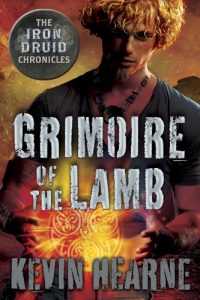 Blog Recap:
Blog Recap: Coming Next Week:
Coming Next Week:













 Blood and Circuses (Phryne Fisher, #6) by
Blood and Circuses (Phryne Fisher, #6) by  This is also the second book I’ve read recently that delves into 20th century circus life. (The other book was
This is also the second book I’ve read recently that delves into 20th century circus life. (The other book was 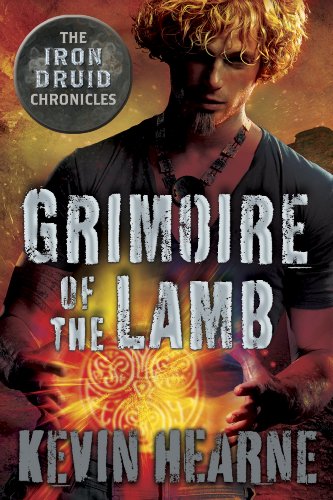 The Grimoire of the Lamb (The Iron Druid Chronicles, #0.4) by
The Grimoire of the Lamb (The Iron Druid Chronicles, #0.4) by 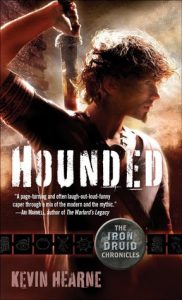 Grimoire of the Lamb is a prequel story to the
Grimoire of the Lamb is a prequel story to the  Secrets of the Tulip Sisters: A Captivating Story about Sisters, Secrets and Second Chances by
Secrets of the Tulip Sisters: A Captivating Story about Sisters, Secrets and Second Chances by 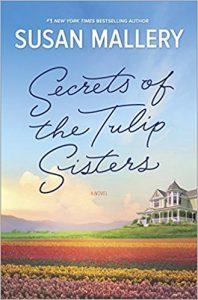 Leo Meierotto, the forty-something site supervisor, stuck his head in Griffith’s office. “Boss, you’ve got company.” Leo’s normally serious expression changed to one of amusement. “Kelly Murphy is here.”
Leo Meierotto, the forty-something site supervisor, stuck his head in Griffith’s office. “Boss, you’ve got company.” Leo’s normally serious expression changed to one of amusement. “Kelly Murphy is here.”
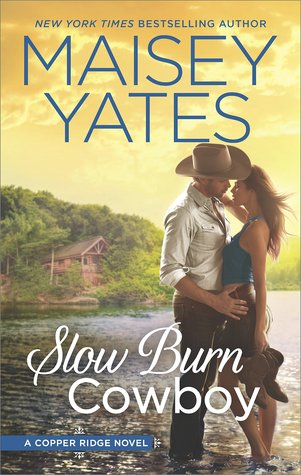 Slow Burn Cowboy (Copper Ridge, #7) by
Slow Burn Cowboy (Copper Ridge, #7) by 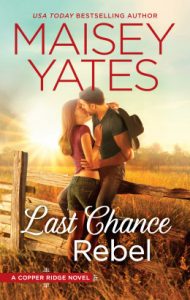 I loved
I loved  Mitla Pass by
Mitla Pass by  I still remember when I first picked up one of Leon Uris’ books. It was in the early 1970s, and I was at my grandparents’ apartment after Sunday School. As usual, my dad was arguing politics with my grandfather (his father) and also as usual, it looked like it was going to take forever. As usual. I discovered a beat-up copy of
I still remember when I first picked up one of Leon Uris’ books. It was in the early 1970s, and I was at my grandparents’ apartment after Sunday School. As usual, my dad was arguing politics with my grandfather (his father) and also as usual, it looked like it was going to take forever. As usual. I discovered a beat-up copy of  Current Giveaways:
Current Giveaways: Blog Recap:
Blog Recap:






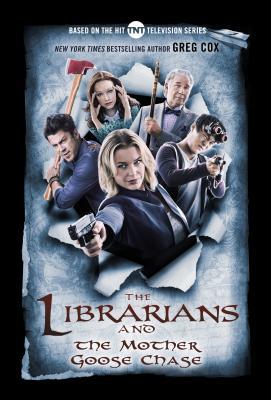 The Librarians and the Mother Goose Chase by
The Librarians and the Mother Goose Chase by 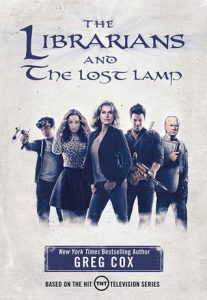 I read
I read